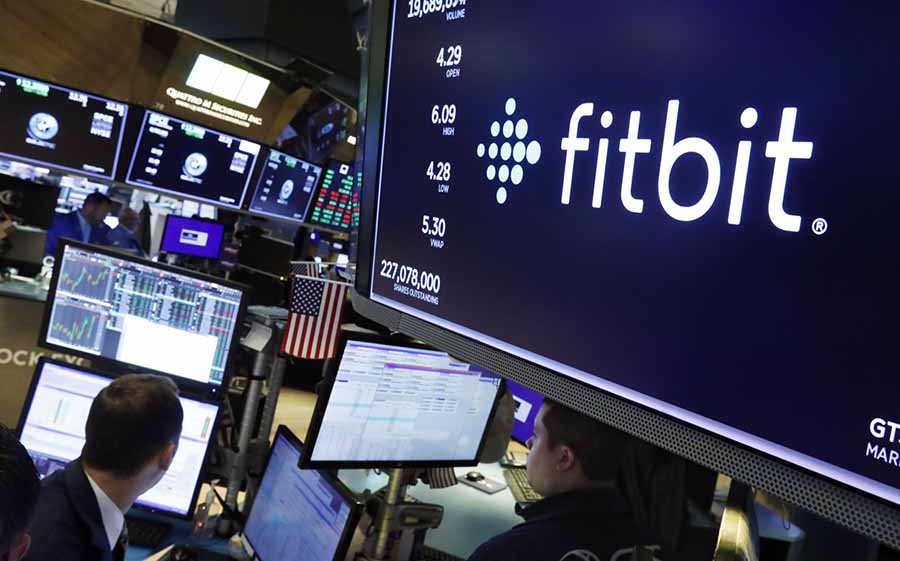With its acquisition by Google looming, Fitbit Inc. on Thursday reported revenue for the fourth quarter of $502 million, which missed Wall Street’s estimates by $29.5 million. The company reported non-GAAP earnings per share net loss of (12) cents, which missed targets by 15 cents.
The company also reported a GAAP net loss per share of (46) cents, GAAP net loss of $(121) million, non-GAAP net loss of $(31) million, cash flow from operations of $28 million and free cash flow of $18 million for its fourth quarter of 2019.
For the full-year 2019, Fitbit reported revenue of $1.43 billion, GAAP net loss per share of $(1.25), non-GAAP net loss per share of $(0.51), GAAP net loss of $(321) million, non-GAAP net loss of $(132) million, cash flow utilized in operations of $(157) million and cash consumption of $(193) million.
“In 2019, we continued to advance our mission of making health accessible to more people around the world by delivering devices, software and services at affordable prices that help improve peoples’ health,” said James Park, co-founder and CEO. “As a result, we sold 16 million devices and our smartwatch business grew 45 percent at retail, due to strong demand for Versa 2. Our community of active users increased to nearly 30 million, and Fitbit Health Solutions grew 17 percent, underscoring the strength of the Fitbit brand. We also launched our new Premium membership, Fitbit’s most personalized experience yet and are seeing improving retention and engagement due to its actionable guidance and coaching. Looking ahead, we expect to grow our higher margin revenue streams in 2020.”
Fourth Quarter 2019 Financial Highlights
- Sold 6 million wearable devices, up 8 percent year-over-year. Average selling price decreased 19 percent year-over-year to $81 per device, driven by the introduction of more accessible and affordable devices and higher promotions.
- International revenue declined 7 percent year-over-year to $226 million with EMEA up 2 percent to $153 million, Americas excluding the U.S. down 2 percent to $44 million and APAC down 40 percent to $29 million, all on a year-over-year basis.
- U.S. revenue decreased 16 percent to $276 million and represented 55 percent of total revenue.
- New devices introduced in 2019, Fitbit Versa 2, Fitbit Versa Lite, Fitbit Inspire, Fitbit Inspire HR, Fitbit Ace 2, and Fitbit Aria Air represented 72 percent of revenue.
- GAAP gross margin was 24.3 percent, and non-GAAP gross margin was 26.3 percent. Gross margin declined year-over-year driven by the device mix shift toward smartwatches, higher promotions, tariffs, and the absence of a benefit from the release of warranty accruals associated with certain products in 2018.
- GAAP operating expenses represented 47 percent of revenue, and non-GAAP operating expenses represented 35 percent of revenue.
Full-Year 2019 Financial Highlights
- Sold 16.0 million wearable devices, up 15 percent year-over-year. Average selling price decreased 17 percent year-over-year to $87 per device, driven by the decision to introduce more accessible and affordable devices, device mix and promotions.
- 39 percent of all activations came from repeat customers; of repeat customers, 54 percent came from customers who were inactive during a prior period.
- U.S. revenue decreased 9 percent year-over-year to $799 million and represented 56 percent of total revenue. International revenue was flat year-over-year to $636 million with EMEA up 7 percent to $410 million. Americas, excluding the U.S., down 6 percent to $95 million, and APAC down 11 percent to $130 million, all on a year-over-year basis, respectively.
- Revenue from Fitbit.com was $143 million, representing 10 percent of revenue.
- The Fitbit Health Solutions business grew 17 percent year-over-year to $95 million in revenue.
- New devices introduced in 2019, Fitbit Versa 2, Fitbit Versa Lite, Fitbit Inspire, Fitbit Inspire HR, Fitbit Ace 2, and Fitbit Aria Air represented 55 percent of revenue.
- GAAP gross margin was 29.8 percent, and non-GAAP gross margin was 31.2 percent. Gross margin declined year-over-year driven by the shift in device mix toward smartwatches, higher promotions, tariffs and the absence of a benefit from the release of warranty accruals associated with certain products in 2018.
- GAAP operating expenses declined 6 percent and non-GAAP operating expenses declined 10 percent, each year-over-year, respectively.
- Cash, cash equivalents and marketable securities totaled $519 million as of December 31, 2019, compared with $723 million as of December 31, 2018.
Full-Year Operational Highlights
- Active users grew 7 percent to 29.6 million from 27.6 million as of December 31, 2018, driven by the introduction of more accessible and affordable devices and improved retention and engagement of users.
- Smartwatch devices sold grew 27 percent to 50 percent of revenue, up from 44 percent of revenue in 2018. Maintained the No. 2 selling smartwatch position in the U.S.
- Tracker devices sold increased 9 percent to 49 percent of revenue, down from 53 percent of revenue in 2018.
- Launched Fitbit Premium, exited 2019 with improved consumer retention and engagement results.
- Fitbit Health Solutions launched a national health program, increased its coverage of Medicaid plans with the signing of Wellcare of Georgia and expansion of the UHC Medicare Advantage program and rolled out a chronic condition coaching platform. Fitbit also announced disease detection partnerships with the BMS/Pfizer Alliance and Fibricheck.
- Headcount totaled 1,684 employees as of December 31, 2019, with 56 percent of employees in research and development.
Additional Highlights and Information
- Fitbit announced its entry into a Merger Agreement with Google LLC on November 1, 2019. Upon close of the all-cash transaction, Fitbit stockholders will receive $7.35 per share in cash, valuing the company at a fully diluted equity value of approximately $2.1 billion.
- Fitbit stockholders approved the transaction on January 3, 2020.
- Regulatory review of the transaction is ongoing. Fitbit and Google are expected to secure the necessary regulatory approvals and close the transaction in 2020. Prior to closing, Fitbit does not expect to provide additional updates on the regulatory process other than during subsequent quarterly earnings reports.
- Due to the pending acquisition by Google, Fitbit does not plan to host an earnings conference call nor provide forward-looking guidance.
Photo courtesy KBC Station















